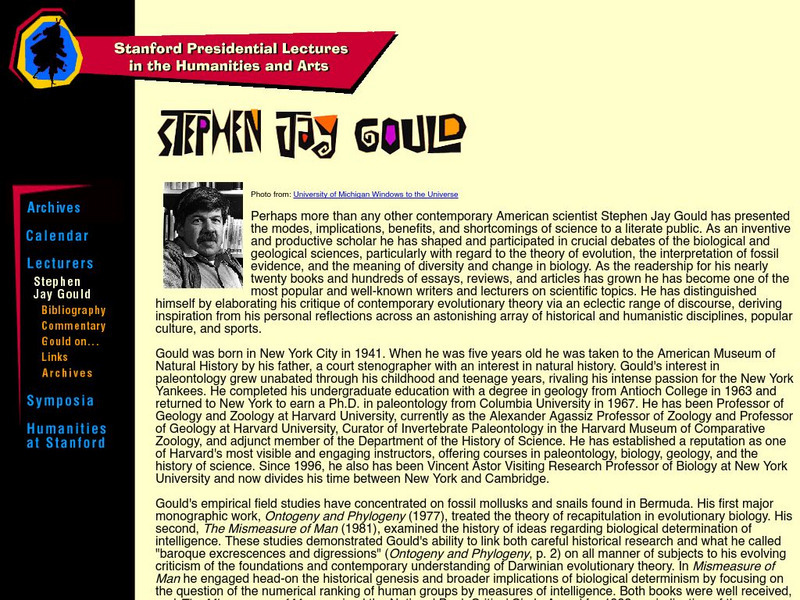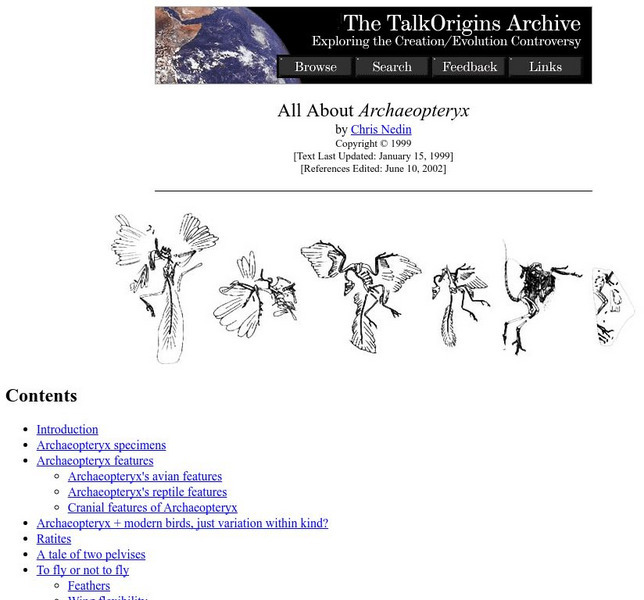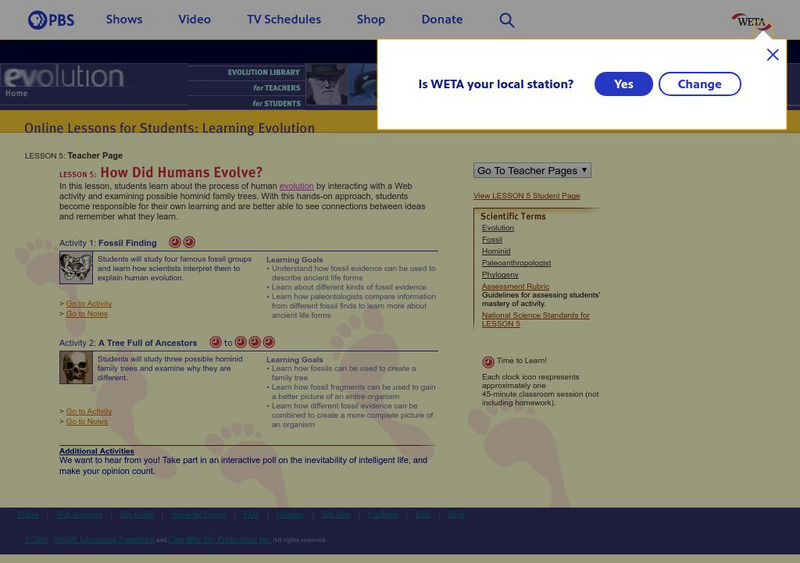Hi, what do you want to do?
Estrella Mountain Community College
Online Biology Book: Paleobiology: Fossils and Time
Find out how fossil evidence has been the major link to learning about Earth's geologic history. See several illustrated interpretations of a geologic time scale in this online biology textbook.
University of California
Ucmp: Learning From the Fossil Record
Fossils provide scientists with clues about Earth's past. This site from the University of California's Museum of Paleontology is great for exploring lots of information on fossils.
Famous Scientists
Famous Scientists: Charles Lyell
Learn about the works of Charles Lyell, a geologist who studied Earth's history.
Curated OER
Unesco: Ethiopia: Lower Valley of the Awash
The Awash valley contains one of the most important groupings of palaeontological sites on the African continent. The remains found at the site, the oldest of which date back at least 4 million years, provide evidence of human evolution...
Indiana University
Ensi: The Great Fossil Find Lesson Plan
Students hear a story as they "find" bones that you have put in an envelope for them. Their job is to begin assembling the bones as best they can. The students will invariably come up with different configurations--just like scientists...
PBS
Pbs Learning Media: Fossils in the Gobi
Biologist Mike Novacek discusses his discovery of mammal fossils in the Gobi Desert and tells us what we can learn from them. From an episode about extinction broadcast on the PBS series "Evolution."
PBS
Pbs: Comparative Embryology: The Vertebrate Body
Provides a student handout in PDF format that looks at the developmental stages of five vertebrate organisms from fertilization to adult form. Students can look at the pictures to see the similarities and differences at the embryo stage...
PBS
Pbs Learning Media: Whales in the Making
This graphic from Evolution, traces the evolution of whales from land-dwelling mammals to the aquatic creatures we know today. A PDF is included that diagrams the evolutionary process that is believed to have taken place.
Stanford University
Stanford Presidential Lectures: Stephen Jay Gould
Standford University provides interesting biographical and professional information on Stephen Jay Gould and his many contributions to scientific thought, including his efforts to help people see science "As something that is important...
Other
Exploring Origins Project: Exploring Life's Origins
Explore life's evolutionary history on the planet through molecular illustrations and animations. Pictorial evidence is based on origin of life research and theory.
Vision Learning
Visionlearning: Cell Biology: Membrane Bound Organelles
Evidence in support of endosymbiosis to show the evolution of organelles within cells.
PBS
Pbs Learning Media: Early Tetrapod Fossils
In this transcript of an interview filmed for the PBS series "Evolution," scientists Ted Daeschler and Neil Shubin describe the discovery and significance of some of their key fossil finds.
CK-12 Foundation
Ck 12: Biology: Fossils
[Free Registration/Login may be required to access all resource tools.] Describes how fossils help us understand the past.
Wonderville Media
Wonderville: Charles Darwin
Charles Darwin was born in England on February 12, 1809. He was a "naturalist," best known for his theories of evolution. Darwin collected evidence that all life on Earth "evolved" from a common ancestry. He studied the process of...
Talk Origins Archive
Talk Origins: All About Archaeopteryx
Good site which appears to take an unbiased approach to examining the wealth of evidence about the origins of birds. Provides tons of information about specimens, features, feather development, and more.
PBS
Pbs Teachers:how Did Humans Evolve?
Explore paleoanthropology by going on a virtual "dig" to answer questions about famous fossil finds. Explain how alternate hominid family trees result from different interpretations of the same fossil evidence.
PBS
Pbs Learning Media: What Killed the Dinosaurs?
This Evolution Web feature explores how evidence can support a variety of hypotheses surrounding the mystery behind the extinction of the dinosaurs.
Curated OER
Unesco: Israel: Sites of Human Evolution at Mount Carmel
Situated on the western slopes of the Mount Carmel range, the site includes the caves of Tabun, Jamal, el-Wad and Skhul. Ninety years of archaeological research have revealed a cultural sequence of unparalleled duration, providing an...
Curated OER
Unesco: Thailand: Ban Chiang Archaeological Site
Ban Chiang is considered the most important prehistoric settlement so far discovered in South-East Asia. It marks an important stage in human cultural, social and technological evolution. The site presents the earliest evidence of...
Curated OER
Unesco: Indonesia: Lorentz National Park
Lorentz National Park (2.35 million ha) is the largest protected area in South-East Asia. It is the only protected area in the world to incorporate a continuous, intact transect from snowcap to tropical marine environment, including...
Curated OER
Unesco: Spain: Teide National Park
Situated on the island of Tenerife, Teide National Park features the Teide-Pico Viejo stratovolcano that, at 3,718 m, is the highest peak on Spanish soil. Rising 7,500 m above the ocean floor, it is regarded as the world’s third-tallest...
Curated OER
Unesco: Tanzania: Ngorongoro Conservation Area
The Ngorongoro Conservation Area spans vast expanses of highland plains, savanna, savanna woodlands and forests. Established in 1959 as a multiple land use area, with wildlife coexisting with semi-nomadic Maasai pastoralists practicing...















